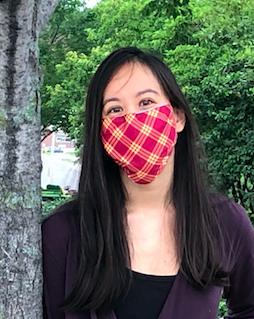The COVID-19 outbreak in the U.S. caused UMD to bring classes online in March, 2020. The transition was difficult for many. “Exactly one month in, multiple students missed online classes simply because of being unaware of the date," writes Viann Nguyen-Feng, an assistant professor in the UMD Department of Psychology. "Students had a maladjusted schedule that led to sleeping over afternoon courses, or feeling impatient with technology."
She chronicled her experiences in an article, “COVID in New York City, the epicenter: A New York University perspective and COVID in Duluth, the Bold North: A University of Minnesota perspective," co-written with Judith L. Alpert, from New York University.
Nguyen-Feng remembered, “Abrupt exam and assignment modifications provoked confusion and anxiety.” And when the academic year was over and summer classes began, she said, “This year… summer has been overshadowed by the uncertainty of quarantine and worsening conditions. With Minnesota now exhibiting one of the fastest coronavirus growth rates in the country, I do not know when I will see my students again in person; I hope that they are able to stay healthy, savor summer, continue their coping strategies, and maintain some of the profound reflections that they had as finals came to a close.”
The article was published in the American Psychological Association’s Division on Trauma Psychology’s flagship journal, Psychological Trauma: Theory, Research, Practice, and Policy, and it joins Nguyen-Feng’s additional work on the impact of the coronavirus outbreak on mental health in 2020. Nguyen-Feng also served as guest co-editor for the journal’s special section on International Perspectives on the Coronavirus Pandemic.
International Focus
A new project promises wider-reaching results for Nguyen-Feng.
Altogether, their task is to conduct an online study that investigates the psychological, cultural, social, and economic impacts of COVID-19 in countries across four continents: North America (United States), South America (Brazil), Asia (Nepal), and Europe/Eurasia (Germany, Austria, Croatia, Georgia, Italy, Lithuania, Netherlands, Norway, Poland, Portugal, Sweden).
It is a “four-wave longitudinal” study, which means they are revisiting participants four times to measure the impact of the pandemic on mental health. The first wave has already taken place in July 2020.
Magnitude Matters
The research acknowledges that the entire world is facing the COVID-19 pandemic, one of the most significant challenges to face humanity in decades. While population-wide public health measures have reduced the spread of coronavirus, social and economic systems remain greatly disrupted.
Nguyen-Feng is particularly interested in how different individuals facing different socio-cultural situations will respond. This study takes into account loss of jobs, access to financial support, cultural and societal aspects, social and health policies, and public policies such as physical/social distancing.
The project is funded by the University of Minnesota Duluth’s startup funds allocated to Nguyen-Feng and Purdue University’s startup fund allocated to assistant professor Xiang Zhou.
Adding to the Research
Nguyen-Feng's current work follows a long journey in counseling, psychology, and mental health. Her undergraduate degree in the natural sciences is from Johns Hopkins University; she has a masters of public health in epidemiology from Eastern Virginia Medical School; and she has two degrees from the University of Minnesota: a master degree in psychology and a Ph.D. in counseling psychology. At UMD, she is a faculty member, as well as the director of the Mind-Body Trauma Care Lab.
In spring 2020, she and her colleagues at the University of Minnesota - Twin Cities adapted a previously developed online intervention to evaluate effectiveness in helping students cope with stress in the context of the COVID-19 pandemic. A second iteration of the study was conducted in summer 2020.
In addition, Nguyen-Feng's work has been featured in publications such as Psychology Today, and several APA journals, including the Journal of Counseling Psychology, Spirituality in Clinical Practice, Psychological Services, Psychology of Women Quarterly, and Psychology of Violence. Her work will also be featured in Psychological Trauma's special issue on Integrative and Complementary Medicine.
About the Department of Psychology
About the Mind-Body Trauma Care Lab

